翻译理论与实践1
- 格式:ppt
- 大小:2.44 MB
- 文档页数:34

钱锺书翻译理论与实践钱锺书学贯古今,被称为“文化昆仑”。
接下来,小编给大家准备了钱锺书翻译理论与实践,欢迎大家参考与借鉴。
钱锺书翻译理论与实践其作品《林纾的翻译》比较全面地反映了钱钟书的翻译观,另有大量见地独到的论述翻译的片段,散落在《管锥编》、《谈艺录》等著述中。
他所标举的“化境”说,更是在中国译界产生了深远影响。
钱锺书提出翻译的最高理想是“化境”。
他认为:“文字翻译的最高理想可以说是‘化’。
把作品从一国文字转变为另一国文字,既能不以语文习惯的差异而露出生硬牵强的痕迹,又能完全保存原作的风格,那就算得入于‘化境’。
”这表明翻译既要用译入语再现原语信息,又能完全保持原作的风味;既要在内容、形式等诸多方面忠实于原作,有要求译文自然流畅,不可生硬牵强。
例1、 One man was lamed in his legs, while another has lost his eyesight. The blind man, taking the lame man on his shoulders, kept a straight course by listening to the other’s orders. It was bitter, all-daring necessity which taught them how, by dividing their imperfections between them, to make a perfect whole.译文:一人腿脚不好,另一人眼睛不好。
盲人背着瘸子,听着他指路。
但教他们如何通过分开他们之间的缺陷,组合为一个完美的整体却需要莫大勇气,因为这有点残忍。
钱译:一跛一盲,此负彼相,因难见巧,何缺成全。
解析:此段摘自《管锥编》,以极简的语言说明了一位盲人和一位跛者相互扶助,取长补短,彼此协作的情况。
译文相较于原文来说,更加精炼,但对原文意思的表达却没有任何删减。
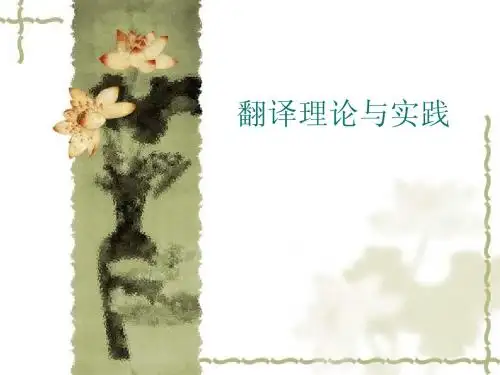
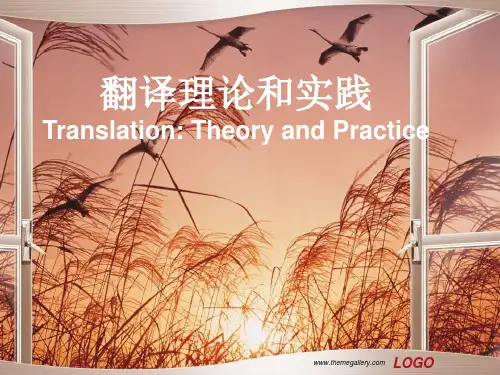

第一章英汉文化对比与翻译有一则趣谈:一所国际公寓闹火灾,里面住有犹太人,法国人,美国人和中国人.犹太人急急忙忙先搬出的是他的保险箱,法国人先拖出的是他的情人,美国人则先抱出他的妻子,而中国人则先背出的是他的老母.一、文化的定义文化是指人类社会历史实践过程中所创造的物质财富,精神财富和相应的创造才能的总和。
文化包括物质文化与精神文化,物质文化是指文化中看得见,摸得着的那部分,因此也称之为硬文化.相对来说,精神文化就是软文化,而软文化则是文化的深层结构。
美国著名翻译理论家尤金.奈达将语言文化特性分为五类:Ecological Culture 生态文化Material Culture物质文化Social Culture社会文化Religious Culture宗教文化Linguistic Culture语言文化二.中西方文化差异(一)西方重唯理,思辩,中方重经验,直觉(二)西方的细节分析与中方的整体综合(三)中西方价值观与人生追求的不同三、文化影响翻译的表现形式:(一)词汇空缺现象(Zero of equivalent word)在一种语言里的有些词在另一种语言里没有对等或契合的词,有人称这种情况为词汇空缺(lexical gap) Salad沙拉Lost Generation迷惘的一代Beat Generation垮掉的一代Baby Boomers生育高峰儿婴儿潮一代Y uppies雅皮士Dinks丁克Sandwich Generation三明治世代Couch Potato电视迷老泡在电视机前的人;终日懒散的人Mall Rats购物狂Hippie嬉皮士功夫kongfu叩头kowtow 炕Kang太极Taichi粽子Zongzi苦力Kuli饺子jiaozi 还有一些民族文化内涵特别丰富的词语,在翻译时也必须采用释义或注释等方法,说明该词的语用含义,才能使译语读者了解原语独特的文化现象。
如:钱先生周岁时“抓周”,抓了一本书,因此得名“钟书”。
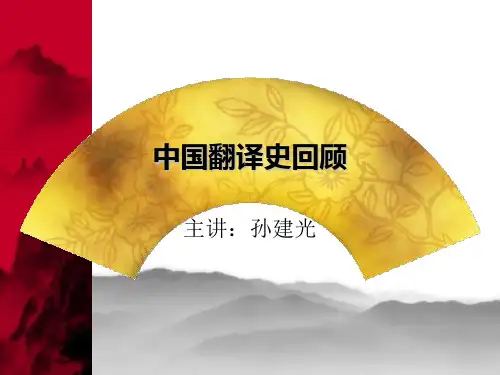
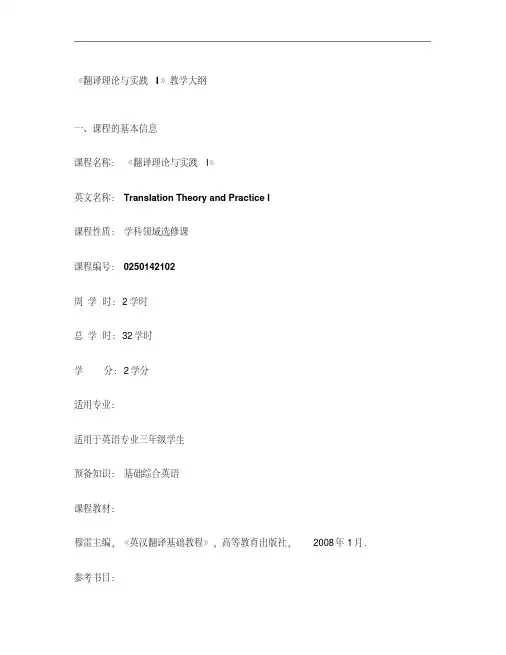
《翻译理论与实践I》教学大纲一、课程的基本信息课程名称:《翻译理论与实践I》英文名称:Translation Theory and Practice I课程性质:学科领域选修课课程编号:025*******周学时:2学时总学时:32学时学分:2学分适用专业:适用于英语专业三年级学生预备知识:基础综合英语课程教材:穆雷主编,《英汉翻译基础教程》,高等教育出版社,2008年1月.参考书目:[1] 张培基主编,《英汉翻译教程》(修订版),上海外语教育出版社出版,2009年.[2] 古今明编著,《英汉翻译基础》,上海外语教育出版社出版,1997年.[3] 刘全福编著,《英汉语言比较与翻译》,高等教育出版社出版,2011年.考核方式:考查制定时间:2013年10月制定二、课程的目的与任务《翻译理论与实践I》课程是英语专业高年级翻译系列课程中的一门专业选修课,面向英语专业本科三年级学生(第五学期)开授。
该课程由翻译理论和实践两部分组成。
翻译理论主要包括翻译的标准与原则,翻译的功能,翻译过程中对原文旨意、风格的理解与分析,以语义翻译和交际翻译为主的各种翻译方法,文化差异对翻译等值的影响等等。
通过对这些翻译理论的介绍,期望学生对国内外影响较大的翻译理论、流派及代表人物有一定的了解,并能够应用相关理论指导自己的翻译实践。
翻译实践课的主要内容是进行与翻译理论同步的翻译实践,通过大量翻译习练使学生熟悉各种翻译技巧并培养学生的文体意识,增强其对忠实传达原文旨意和风格的重要性的认识,以及对中英语言和文化差异对翻译影响的认识,进而全面提高其实际翻译能力。
《翻译理论与实践I》课程以英译汉为主。
三、课程内容及学时分配章节内容学时第一章翻译概述 4 第二章英汉语言文化比较 4 第三章理解原文 2 第四章基本翻译技巧 6 第五章英语词汇的汉译 4 第六章英语句子的汉译 6 第七章英语篇章的汉译 6合计32第一章翻译概述(4学时)一、本章基本要求1.了解翻译的定义;2.了解翻译的过程;3.理解并掌握翻译的标准;4.理解国内外具有代表性的翻译思想;5.了解对一名翻译人员的基本要求。
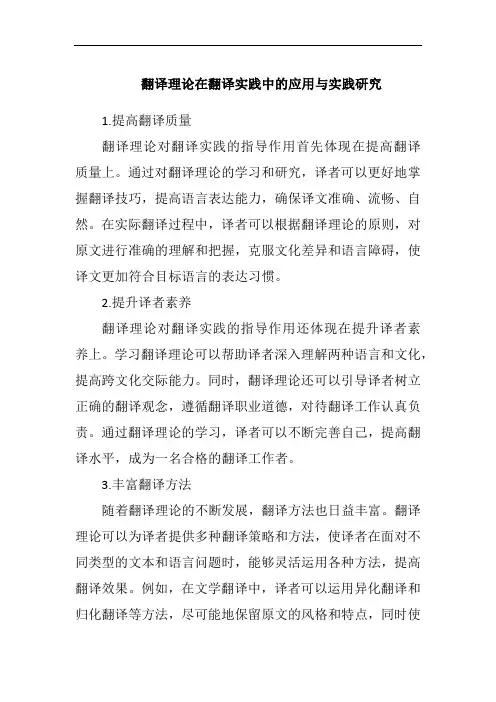
翻译理论在翻译实践中的应用与实践研究1.提高翻译质量翻译理论对翻译实践的指导作用首先体现在提高翻译质量上。
通过对翻译理论的学习和研究,译者可以更好地掌握翻译技巧,提高语言表达能力,确保译文准确、流畅、自然。
在实际翻译过程中,译者可以根据翻译理论的原则,对原文进行准确的理解和把握,克服文化差异和语言障碍,使译文更加符合目标语言的表达习惯。
2.提升译者素养翻译理论对翻译实践的指导作用还体现在提升译者素养上。
学习翻译理论可以帮助译者深入理解两种语言和文化,提高跨文化交际能力。
同时,翻译理论还可以引导译者树立正确的翻译观念,遵循翻译职业道德,对待翻译工作认真负责。
通过翻译理论的学习,译者可以不断完善自己,提高翻译水平,成为一名合格的翻译工作者。
3.丰富翻译方法随着翻译理论的不断发展,翻译方法也日益丰富。
翻译理论可以为译者提供多种翻译策略和方法,使译者在面对不同类型的文本和语言问题时,能够灵活运用各种方法,提高翻译效果。
例如,在文学翻译中,译者可以运用异化翻译和归化翻译等方法,尽可能地保留原文的风格和特点,同时使译文符合目标语言的表达习惯。
4.促进翻译评价体系的完善翻译理论对翻译实践的指导作用还可以体现在促进翻译评价体系的完善上。
翻译理论可以为译者提供评价译文质量的标准和方法,使译者在翻译过程中有据可依,提高翻译质量。
同时,翻译理论还可以帮助翻译评审者和读者更好地评价译文的质量,确保翻译工作的公平、公正、公开。
总之,翻译理论在翻译实践中的应用与实践研究具有重要意义。
翻译理论对翻译实践具有指导作用,可以提高翻译质量、提升译者素养、丰富翻译方法和促进翻译评价体系的完善。
因此,译者应当重视翻译理论的学习和研究,将翻译理论运用到实际翻译工作中,不断提高自己的翻译水平,为我国翻译事业的发展做出贡献。
同时,翻译理论研究者也应关注翻译实践,结合实际翻译问题,不断丰富和发展翻译理论,为翻译实践提供更有针对性和实用性的指导。
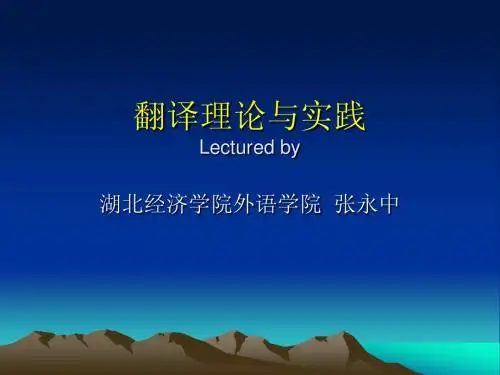


翻译理论与实践1(英译汉)实战练习15篇1.The Policy of Mass Media1) Life is indeed full of problems on which we have to make decisions as citizens or as private individual.2) But neither the real difficulty of these decisions nor their true and disturbing challenge to each individual can often be communicated through the mass media.3) The disinclination to suggest real choice which is to be found in the mass media is not simply the product of a commercial desire to keep the customers happy.4) The organs of the Establishment however well—intentioned they may be have a vested interest in ensuring that the public boat is not violently rocked and will so affect those who work within the mass media that they will be led insensibly towards forms of production which though they go through the motions of dispute and inquiry do not break through the skin to where such inquires might really hurt.5) They will tend to move when exposing problems well within the accepted cliché—assumptions of democratic society and will tend neither radically to question these clichés nor to make a disturbing application of them to features of contemporary life2. The American and the English1) Of the intrinsic differences that separate American from English the chief have their roots inthe obvious disparity between the environment and traditions of the American people since the seventeenth century and those of the English.2) The latter have lived under a relatively stable social order and it has impressed upon their souls their characteristic respect for what is customary and of good report.3) Until the World War brought chaos to most of their institutions their whole lives were regulated perhaps more than those of any other people save the Spaniards by a regard for precedent.4) The Americans though partly of the same blood have felt no such restrain and acquired no such habit of conformity.5) On the contrary they have plunged to the other extreme for the conditions of life in their country have put a high value upon the precisely opposite qualities of curiosity and daring and so they acquired that character of restlessness that impatience of forms that disdain of the dead hand which now broadly marks them.3. The Education of Humanists1)The education of humanists cannot be regarded as complete or even adequate without exposure in some depth to where things stand in the various branches of science particularly in the areas of our ignorance.2)Physics professors most of them look with revulsion on assignments to teach their subjects to poets.3) The liberal arts faculties for their parts will continue to view the scientists with suspicion and apprehension. 4) But maybe a new set of courses dealing systematically with ignorance in science will take hold.5) The scientists might discover in it a new and subversive technique for catching the attention of students driven by curiosity delighted and surprised to learn that science is exactly as some scientists described it: an “endless frontier.”6) The humanists for their part might take considerable satisfaction in watching their scientific colleagues confess openly to not knowing everything about everyone.7) And the poets on whose shoulders the future rests might late nights thinking things over begin to see some meanings that elude the rest of us.4. . American Study1) The scientific interest of American history centered in national character and in the workings of a society destined to become bast in which individuals were imp0rtant chiefly as types.2) Although this kind of interest was different from that of European history it was at least as important to the world.3) Should history ever become a true science it must expect to establish its laws not from the complicated story of rival European nationalities but from the economical evolution of a great democracy.4) North America was the most favorable field on the globe for the spread of a society so large uniform and isolated as to answer the purposes of science.5) There a single homogeneous society could easily attain proportions of three or four hundred million persons under conditions of undisturbed growth.6) In Europe or Asia undisturbed social evolution had been unknown.7) Without disturbance evolution seemed to cease.8) Wherever disturbance occurred permanence was impossible.9) Every people in turn adapted itself to the law of necessity.5. Jack London1) Life itself led London to reject this approach in his writing.2) He knew what it meant to be one of the disinheritedto be chained to the deadening routine of the machine and to soul-destroying labor for an insufficient reward.3) Consequently he swept aside not only the literature that pretended that ours is a society of sweetness and light but also that which contended that the inculcation of the spirit of Christian fellowship would put an end to class controversy.4) He did not oppose labor organization nor balk at the strike as a weapon of labor; rather he took his heroes and heroines from the labor movement and wove his plots within their struggles.5) He poured into his writings all the pain of his life the fierce hatred of the bourgeoisie that it had produced in him and the conviction it had brought to him that world could be made a better place to live in if the exploited would rise up and take the management of society out of the hands of the exploiters.6. President Carter1) President Carter has been calling his closest advisers together for what is called as a hard reappraisal of his administration’s troubles but who will tell him the truth? 2) You can almost put it down as a general rule in this town that presidents often invite “honest criticism” from their aides but seldom get it and usually don’t follow it when they do.3) The reasons for this are not obscure.4) The Oval Office is the most frightening room inAmerica.5) It imposes a kind of respect on most visitors and even those legislative lions who roar against the president on Capital Hill tend to usually lower their voices and follow their prepared speeches when they walk through the White House door.6) Few While House aides dare to say anything against the president without betraying their fears.7) Even Henry Kissinger who is not an excessively modest or silent man hesitated to face President Nixon with the disaster he knew lay ahead.7.On “Mein Kampf”1) Mein Kampf’s the me song recurring again and again is race race purity race supremacy though nowhere did Hitler attempt to define race.2) It was never intended by Nature Hitler claims that all races should be equal any more than individuals are equal.3) Some are created superior to others.4) The Germans as the world’s strongest race should rule over the inferior through having the habitat of the highest race extended and scattered Germanic peoples united under one rule.6) The vast expansion visualized by Hitler would take place principally at the expense of other races.7) To attain the objectives set by his soaring ambition Hitler proposes three methods: propaganda diplomacy and force. 8) Nowhere in Mein Kampf is the author more revealing of himself and his tactics than in his discussionof propaganda techniques—correctly believed by him to be one of the Nazis’ most effective and formidable weapons.8. How to Write Clearly1) I have never had much patience with the writers who claim from the reader an effort to understand their meaning.2) You have only to go to great philosophers to see that it is possible to express with lucidity the most subtle reflections.3) One cause of obscurity is that many writers think not before but as they write.4) The pen originates the thought.5) The disadvantages of this and indeed it is a danger against which the author must be always on his guard is that there is a sort of magic in the written word.6) The idea acquires substance by taking on a visible nature and then stands in the way of its own clarification.7) But this sort of obscurity merges very easily into the willful.8) Some writers who do not think clearly are inclined to suppose that their thoughts have a significance greater than at first sight appears.9) It is flattering to believe that they are too profound to be expressed so clearly that all who run may read and very naturally it does not occur to such writers that the fault is with their own minds which have not the faculty of precise reis with their own minds which have not the faculty of precise reflection.9. 1) Of course there is a strong element of luck in both success and failure but it is my belief that there are no “secrets” to success.2) One thing I have discovered is that attitudes and values that I acquired in China long before came to the United States have had a great bearing on the success in my business.3) These values have much in common with some of the virtues of Confucianism the Chinese philosophy that stresses moderation.4) However although I respect the spirit of Confucianism I have not tried to adapt this ancient Chinese philosophy to modern society.5) For besides moderation other things I have found to be essential to success are patience adaptability decisiveness confidence unconventional thinking social responsibility and last luck.6) The importance of these attributes is in their interaction.7) Some of them are antithetical to others—patience will often collide with decisiveness for instance—and yet it is hard to think of any of my decisions in which they did not play a role.10. Tragedy1) Our tragedy today is a general and universal physical fearso long sustained by now that we can even bear it.2) There are no longer problems of the spirit.3) There is only the question:4) When will I be blown up? 5) Because of this the young man or woman writing today has forgotten the problems of the human heart in conflict with itself which alone can make good writing because only that is worth writing about worth the agony and the sweat.6) He must learn them again.7) He must teach himself that the basest of all things is to be afraid; and teaching himself that forget it forever leaving no room in his workshop for anything but the old verities and truths of the heart the universal truths lacking which any story is ephemeral and doomed—love and honor and pity and pride and compassion and sacrifice.8) Until he does so he labors under a curse.9) He writes not of love but of lust of defeats in which nobody loses anything of value of victories without hope and worst of all without pity or compassion.11. The Choice of Life1) The lives of most men are determined by their environment.2) They accept the circumstances amid which fate has thrown them not only with resignation but even with goodwill.3) They are like streetcars running contentedly on their rails and they despise the motorcycle that dashes in and out of the traffic and speeds so jauntily across the open country.4) I respect them; they are good citizens good husbands and good fathers and of course somebody has to pay the taxes; but I don’t find them exciting.5) I am fascinated by the men few enough in all conscience who take life in their own hands and seem to mould it to their own liking.6) It may be that we have no such thing as free will but at all events we gave the illusion of it.7) At a cross-road it does seem to us that we might go either to the right or the left and the choice once made it is difficult to see that whole course of the world’s history obliged us to take the turning we did.12. Science Fiction1) Moreover if SF is the laboratory of the imagination its experiments are often of the kind that may significantly alter the subject matter even as they are being carried out.2) That is SF has always had a certain feedback effect on society as its visions emotionally engage the future consciousness of the mass public regarding especially desirable and undesirable possibilities.3) The shape a society takes in the present is in part influenced byits image of the future.4) For that matter some individuals in recent years have even shaped their own life-style after appealing models provided by SF stories.5) The diffusion of SF futuristic images of alternative societies through the media of movies and television may have speeded up and augmented SF’s social feed back effects.6) Thus SF is not only change speculator but change agent sending an echo from the future that is becoming into the present that is sculpting it.7) This fact alone makes imperative in any education system the study of the kinds of works discussed here.13. 1) Since the 1970s the Chinese community in the USA has undergone tremendous changes among which is its rapid increase in population as many Chinese have kept flooding into America’s shore.3) As the population of the American citize ns of Chinese descent has increased and their qualities have evidently improved so their economic conditions have prospered.4) It is said that since 1986 the US citizens of Chinese descent have leapt to a good lead over other racial minorities Japanese and Koreans for instance.5) The average Chinese family’s yearly income has now come to exceed that of the average American family.6) At present there is a number ofenterprisers of Chinese descent in the economic circles in the US who enjoy considerable fame.7) An even more cheerful phenomenon is that in recent years there have sprung up in the US prominent scientific and technical talents of Chinese descent.8) Their achievements have come to command the notice and admiration of scientists and technical experts in the world.9) Meanwhile Chinese-descent citizens have roles to play in American political circles as they have risen evidently in political status.14. Attitudes towards retirement vary from person to person.2) Some people think that they will enjoy their time in retirement, 3) but when it comes they may feel a little disappointed.4) Unwilling to resign themselves to the prospect of being put on the scrap heap they try to seek alternative outlets for their energies and alternative sources of income that employment can provede.5) Others have already prepared themselves for the significant change in their lives.6) Tired out after all exhausting life revolving around work they are anxious to relax in retirement with all the strains relieved.7) As there is no more need to rush to catch a morning bus and no more anxiety about promotion they now have enough time to fulfill an old dreamsuch as writing painting growing flowers and traveling around.8) On the whole female workers tend to have a more favorable attitude towards retirement than male workers.9) Withdrawal from employment to complete domesticity is a far less threatening experience for a woman than for a man.15. Mr. Zhang a retired miner bought four chicks early this yeae.2) One day he found one of them missing.2) He got so angry that he kept blaming his wife for it all the time.3) Towards evening into his yard came a chick followed by his neighbor Wang who ran to catch the chick.4) Naturally Zhang’s wife wouldn’t let him go with the chick.5) and so a quarrel ensued.6) It turned out that Wang had also lost one of his two chicks recently which he bought nearly the same time as Mr Zhang did.7) Their quarrel drew another neighbor Lee to the yard to see what was happening.8) Having heard the story he put the chick somewhere between their homes and let it off.9) The chick went straight to join Zhang’s flock and kept returning whenever it was driven to Wang’s home.10) And at Zhang’s call “Chick chick” all the chicks including the one in question recede in response to him.11) Wang had no more to say but made an immediate apologize. Thus ended the quarrel over a chick.。
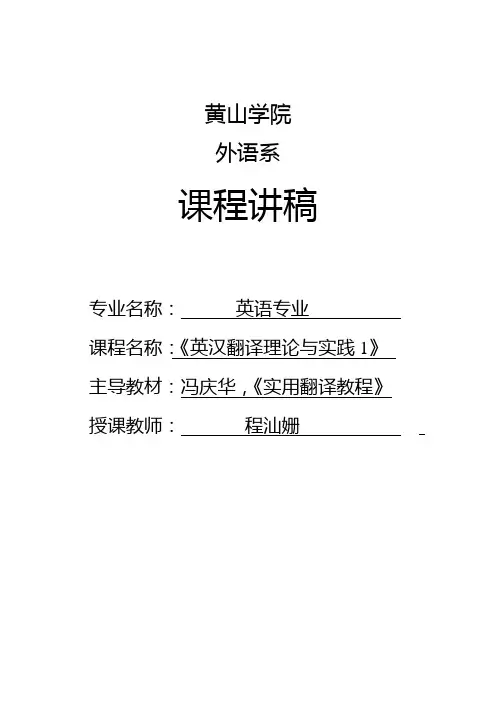
黄山学院外语系课程讲稿专业名称:英语专业课程名称:《英汉翻译理论与实践1》主导教材:冯庆华,《实用翻译教程》授课教师:程汕姗A Brief Introduction to Translation◇Teaching Contents:I.Discussion:●What is translation?●What is a successful translation?●What difficulties might occur in translating process?A.What is translation?1.Key words:source language(SL) / receptor language / target language(TL); reproduce; message /information; equivalence / correspondence2.Nature of translationTranslation consists in reproducing in the receptor language the closest naturalequivalent of the source language message, first in terms of meaning and secondly interms of style. (Eugene A. Nida)德国译学教授Wolfram Wilss 在The Science of Translation:Problems & Methods一书中说:Translation is not simply a matter of seeking other words withsimilar meaning, but of finding appropriate ways of saying things in another language.Translating is always meaning-based, i.e. it is the transfer of meaning instead of formfrom the source language to the target language.(翻译不只是在另一种语言中寻找意义相似的其他词语,而是寻找表达事物的适当方式。
理论与实践英语作文及翻译Theory and Practice。
Theory and practice are two important components in the process of learning. Theory provides us with a frameworkfor understanding and analyzing concepts, while practice allows us to apply these concepts in real-life situations. Both theory and practice are necessary for a comprehensive understanding of any subject.Theoretical knowledge is important because it helps us to understand the underlying principles of a subject. For example, in the field of physics, theoretical knowledge helps us to understand the laws of motion, the properties of matter, and the behavior of energy. Without this theoretical knowledge, it would be difficult to make sense of the world around us.However, theoretical knowledge alone is not enough. We also need to apply this knowledge in real-life situationsin order to fully understand its implications. This is where practice comes in. Through practice, we can test our theories and see how they work in real-life situations. For example, a doctor may have a theoretical understanding of how to treat a particular illness, but it is only through practice that they can develop the skills and experience necessary to successfully treat patients.Theory and practice are also interconnected. Theoretical knowledge can inform our practice, while practice can also lead to new theoretical insights. For example, a scientist may develop a new theory based on observations made during an experiment.In conclusion, theory and practice are both essential components of learning. Theoretical knowledge provides us with a framework for understanding concepts, while practice allows us to apply this knowledge in real-life situations. By combining theory and practice, we can gain a comprehensive understanding of any subject and develop the skills and experience necessary to succeed in our chosen field.理论与实践。